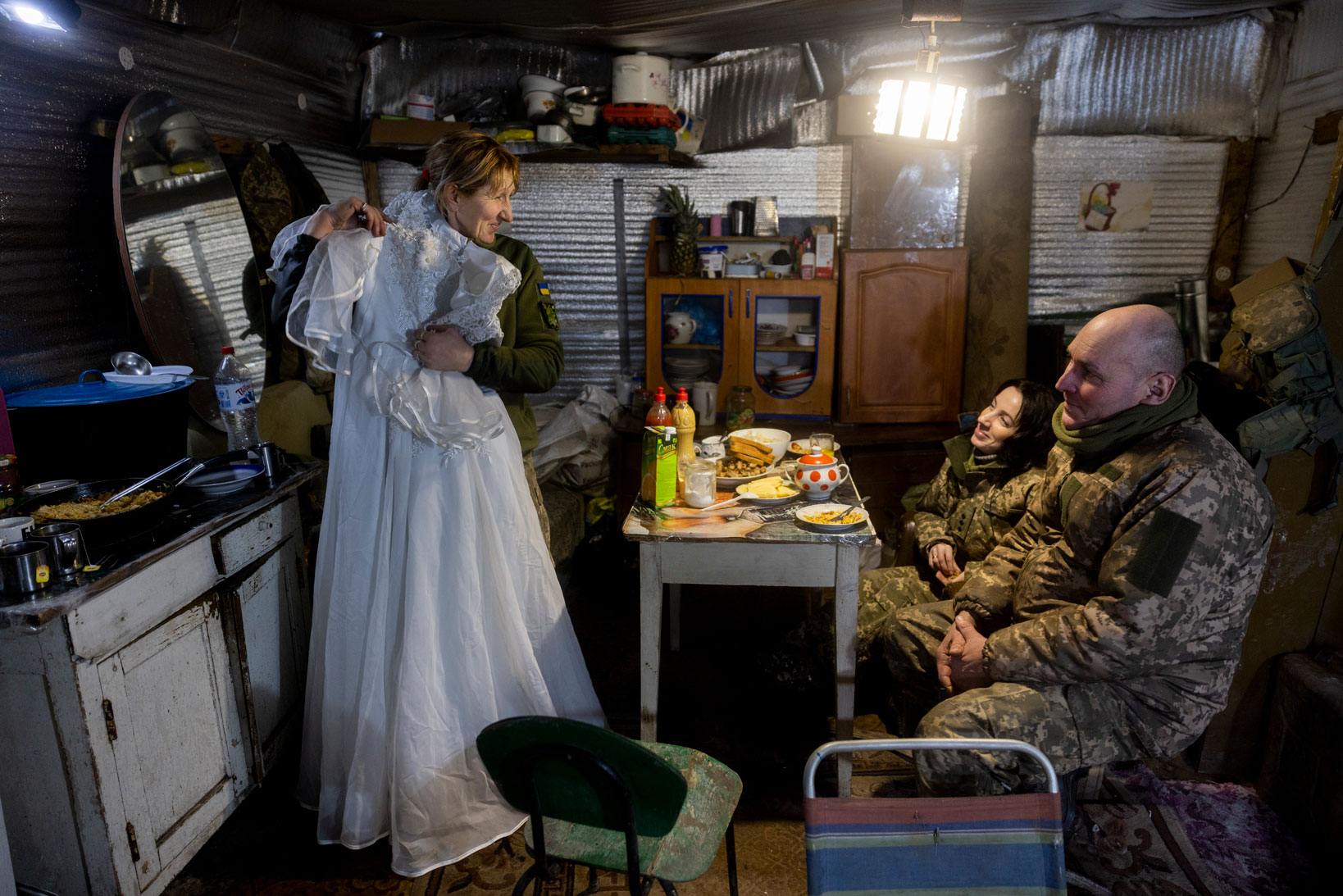Not far from the runway at the shattered Donetsk International Airport, soldier Nika, 50, looks out at the fields and away from the ruins of the air traffic control tower. The Russian-backed separatists are only a couple of miles away, but right now the situation is calm.
She invites us to the base, which is an old garage. Along the walls are boxes of ammunition. “Come in and sit down now, I’ll make sure you get food. Now everyone should eat,” Nika says.
She laughs and jokes without interruption. When one of the soldiers protests and says that he should only drink coffee, he immediately gets a reprimand: “What now!? I do not understand. Are you not going to eat? Sit down now.”
Nika moves around in a flurry and heats the fried rice with meat in a pan; from a large saucepan she scoops up sturdy plates of Ukrainian borscht.
Nika is a mother of five and has three grandchildren. Five years ago, she left that life behind and joined the Ukrainian army. Now she lives at the front in the trenches; the garage is her home.
From a metal cupboard she takes out a large machine gun and shows it. “This is my favorite weapon,” she says.
During lunch Nika tells us about her life and how she married the commander of her post last year. She shows us pictures of the wedding on her phone. “We were given two days off, so we rented an apartment and booked an appointment with the wedding official.”
After the wedding night, she and her husband, Alexander, 47, returned to the front, where they now have their own room in the basement of the garage, complete with a double bed. “We spent our honeymoon here. I even have the wedding dress here. Do you want to see?” she asks.
Nika rummages among bags and purses, takes out a white wedding dress and holds it in front of her. “You are our queen,” says Alexei, a 53-year-old soldier.
Nika continues, “When we came back from the wedding, we received a salute from the separatists; it was a real shelling, so thank you for that.”
Before the war, the Piski area was a fairly affluent residential area with both apartment buildings and lavish villas. Now everything has been destroyed and abandoned. The area is reminiscent of the abandoned city of Pripyat in the Exclusion Zone near the site of the 1986 Chernobyl nuclear power plant disaster. But here the houses are full of large bullet holes and broken windows, and stairwells are filled with snowdrifts.
In one apartment we find dolls and a family album in a heap on the floor. The photos include a picture of a woman holding a child and another of a woman posing with sunglasses and yellow flowers in her hand.
At a local school, the roof has collapsed and desks are scattered around the classroom. A mural with the three little pigs is about to flake off the wall. The preschool is in the same state; the children’s name tags remain on the wardrobes. High-caliber ammunition lies on the floor in the hallways, bullet holes all over the walls.
Everywhere we look, we see evidence of the lives hastily abandoned in the midst of a burning war.
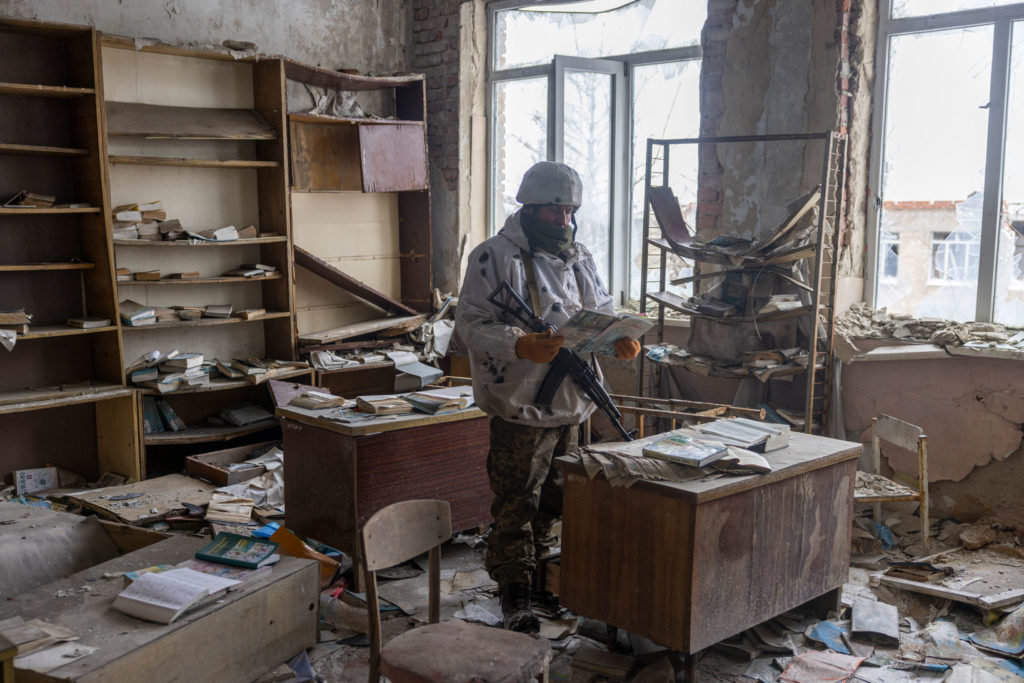
Light snow falls over the trenches at a forest edge on the outskirts of the village of Zolote in Luhansk. We are with the Ukrainian army on the front lines; with Russia showing signs that it intends to invade, the eight-year war against the separatists has again caught the world’s attention. The sun has set, but the sky is still bright. Soldier Evgen, 42, puts wood in the iron stove, and a warm glow lights his face. He and the other soldiers are unfazed by the smoke that fills the foxhole.
Gunfire has started again in the neighboring village of Katerynivka. It comes in short bursts followed by some heavier dull bangs from a grenade or rocket launcher. Silence follows. Evgen makes a face without saying anything and sips his coffee. For the soldiers, the regular shelling has become normal.
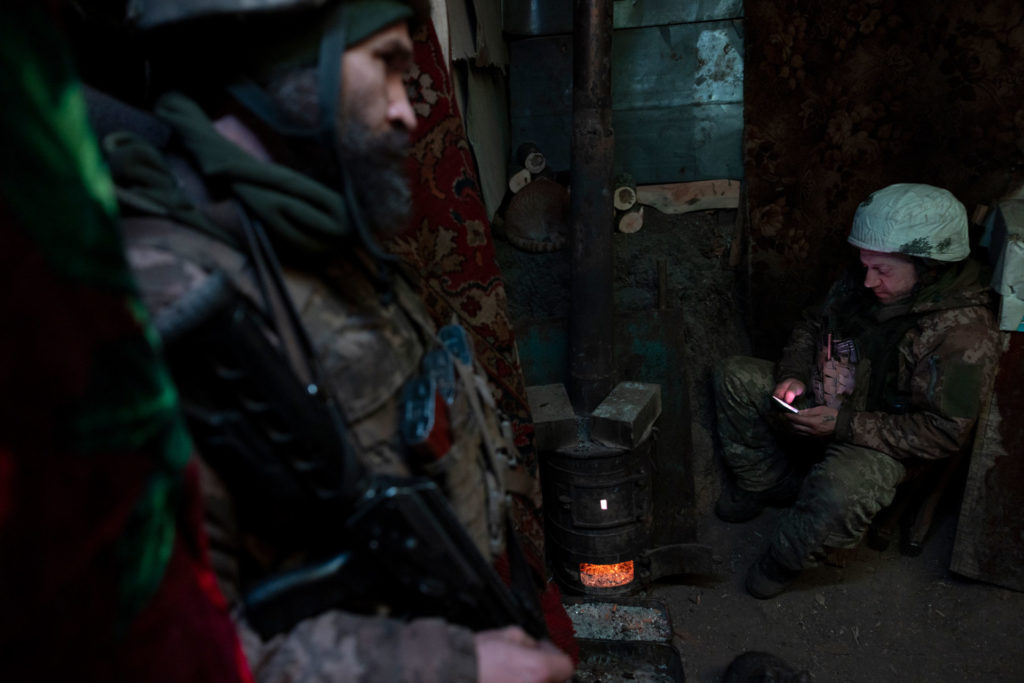
But, says 47-year-old Vita, a soldier we meet in the trenches, “it’s tense when they shoot and tense when they do not shoot.” Vita is an assistant grenade launcher, and for three years she has lived and served at Zolote. She was on leave over the Christmas weekend. Her nails are freshly painted purple. She puts on her gloves.
“It’s nice to do something for yourself, to make yourself beautiful, but it’s really forbidden here,” she says.
Vita has two children. The youngest is 16 and lives at home with Vita’s mother. We asked her why she enlisted. “I have always wanted to serve in the army; I like it,” she explained. “It can be heavy, and it has its [difficult] aspects of course, but what should I do at home? Something is happening here. You feel needed.”
As much as Vita indicated she was driven by a sense of purpose, when asked how she thought the war would end, she focused instead on how the war came to pass. “We have so much anger. Nobody needed this war. Not there and not here,” she began. “If someone had told me 30 years ago that we would wage war against Russia … in every family here there is someone from Russia, in every family. Yesterday we drank together at the same table. Now they are our enemies?”
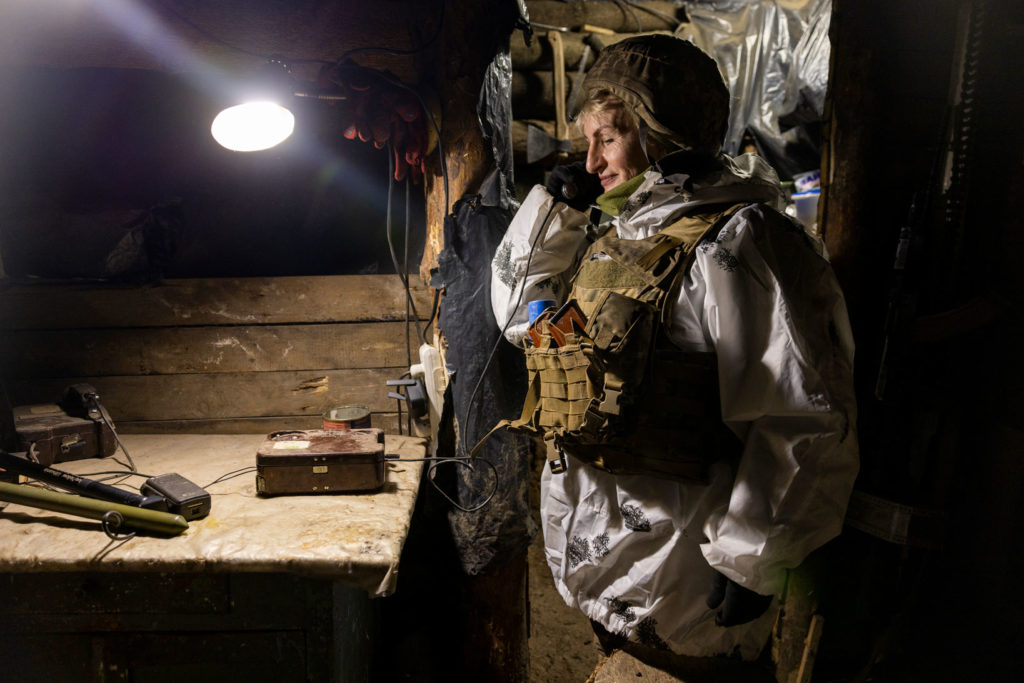
The roof and walls of the foxhole are lined with logs, and thick carpets cover rough-hewn boards. It looks like a scene from a World War I film — if it weren’t for the loop of LED lights that glow in different colors, the iPhone charger that hangs down from an extension cord or the grenade attachment for the Kalashnikov that hangs on a nail.
The trenches of 2022 come with Wi-Fi — though not without hassle. The soldiers attach a 4G router to the end of a long stick, which they hold up from the trench to get reception. In a closed dialogue via WhatsApp, they receive updates about where shooting is coming from and whether they should shoot back.
In the autumn, when it rains, most of the ground turns into mud. Some of the bunkers are filled with so much water that the soldiers have to scoop it out as if they were in a leaky boat. In the summer, they are plagued by mosquitoes as “big as mutants.”
The field phone faintly buzzes.
Oleg, a 47-year-old soldier, picks it up and says “450” and hangs up.
We are at the last position before the enemy. During the day the base calls once an hour to check that everyone in the patrol is awake and alive. At night, the calls come every half hour, and if the situation is strained, every 15 minutes. The soldiers sit in their post for four hours. Then they have eight hours off before it’s time to return for another shift.
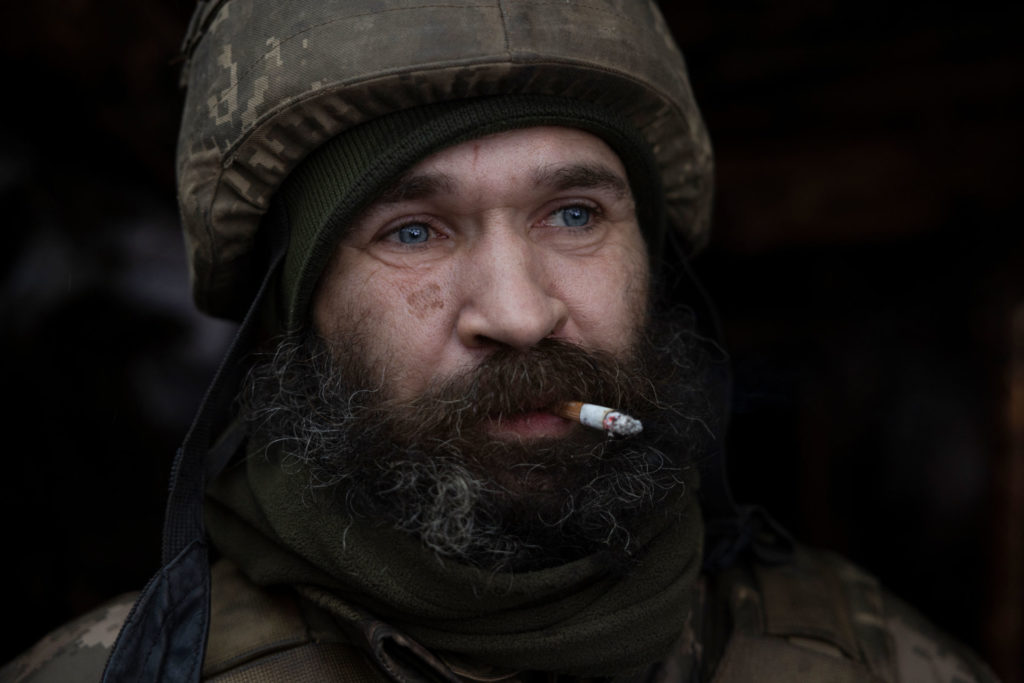
Inside the trench it’s claustrophobic, like a tomb with walls of black earth and severed roots. Looking up there is only gray sky and bare tree trunks stretching upward. It’s hard to shake the thought that this is what a view from a coffin would look like. Outside in the fresh air, the trench appears deep.
Cats and dogs are everywhere here. The soldiers cuddle with them as if they were their own children. The dogs follow them faithfully to the posts and the cats run free — not like the humans.
In a shattered house, the soldiers have their base. The upper floors are abandoned, the windows are broken, balcony doors are open, and in a window at the top a curtain flutters in the wind. The soldiers sleep on the ground floor.
They call it Pavlov’s house — after a famous house in Stalingrad (now Volgograd) where Soviet troops held their position against all odds in the autumn of 1942. At the entrance, someone has written PTN-XLO, an abbreviation for “Putin is a cock.”
On one of the gravel-filled gabions outside, soldiers have attached a picture of Putin — it is full of bullet holes and is sometimes used for shooting exercises.
The soldiers say that they sometimes swear and shout harsh insults at the soldiers in the trenches on the other side. The reply is usually reciprocal rudeness and shots from a Kalashnikov. Sometimes the Russian-backed rebels sneak up in an attempt to make an attack. A post we are visiting had such an attack last week.
Oleksandr, 39, tells how they arrived in the middle of the day. “A group came up here and opened fire. We saw the mouth flames about 40 meters from here.” He points to the bushes not far from their foxhole. “We saw them and gave an adequate answer and they ran back,” Oleksandr says. The shelling sometimes comes from large-caliber grenade launchers and rocket launchers.
Some soldiers here are angry about their situation. At another part of the front, a soldier on the run has walked directly over a minefield and straight into the hands of the soldiers on the other side.
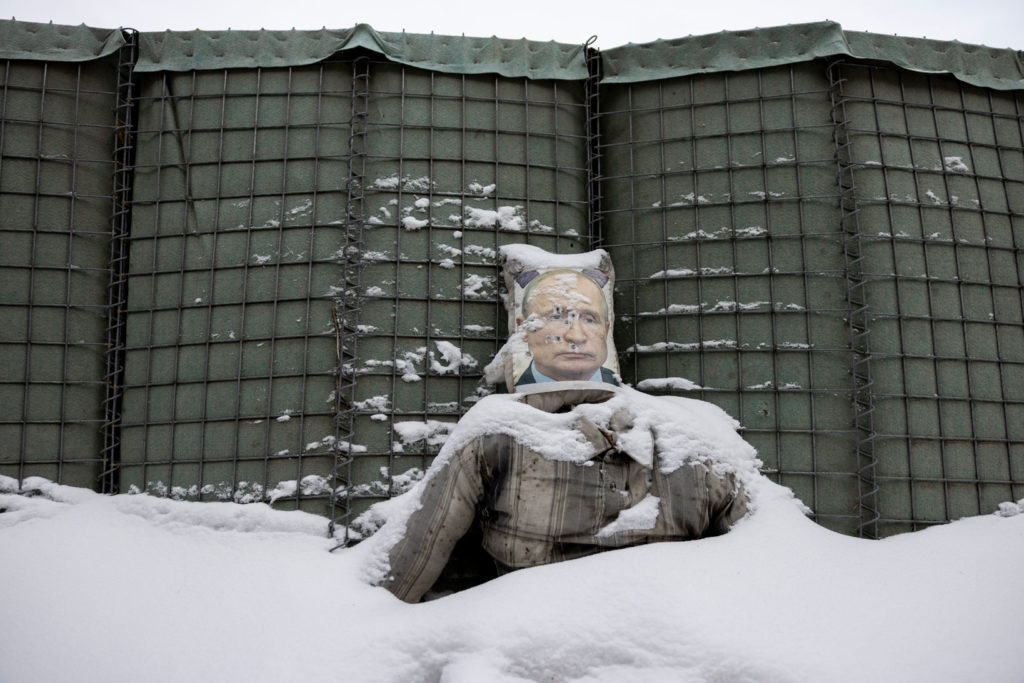
Vitalii, 38, comes from Crimea, where he was a junior lawyer and ran his own company. After the Russian takeover in 2014, he went to eastern Ukraine to fight with Ukrainian voluntary units. Several of his Crimean comrades did as he did and went back and forth between their home in Russian-controlled Crimea and fighting in eastern Ukraine. But the Russian intelligence service arrested them one by one and eventually Vitalii was wanted and forced to flee. It was 2015. Since then he has served in the Ukrainian army.
“I was forced to leave my home, my company, my car, my house,” he explained. “One night I took some underwear and socks and fled. And so began this misery.”
It is clear that the years spent on the front lines has severely affected Vitalii, especially the early years when fighting was intense. He says that he has been hit several times by stun grenades, which produce a blinding flash of light and a loud bang. The weapon is designed to disorient its victim, but it can cause serious internal injury to soft tissue, including the lungs and brain.
Vitalii is not afraid to say what he thinks about new, inexperienced officers and recruits who he believes have not received proper training. “They have no idea what it’s like to be in battle. They have gone here in the trenches and believe that this is how the war will be. And if something lands 100 meters away from them, they run really scared, just because it slammed,” he says. “And the officers are also new and never fired at 22-year-olds who were still in school when the war began.”
He has no hope of seeing his home in the Crimea again. “Of course I want to go home, but we can forget Crimea. No one will fight for Crimea and the whole of Russia will rise up to defend it, so it’s just [better] to forget it, pointless to even try.” Still, Vitalii’s conviction in the fight remains steadfast. “But here we still have the chance, to fight back [for] our territory.”
In a small apartment in Bakhmut in the Donetsk region, 5-year-old Sofia proudly shows her dance skills before getting on her scooter and riding back and forth between the kitchen and another room.
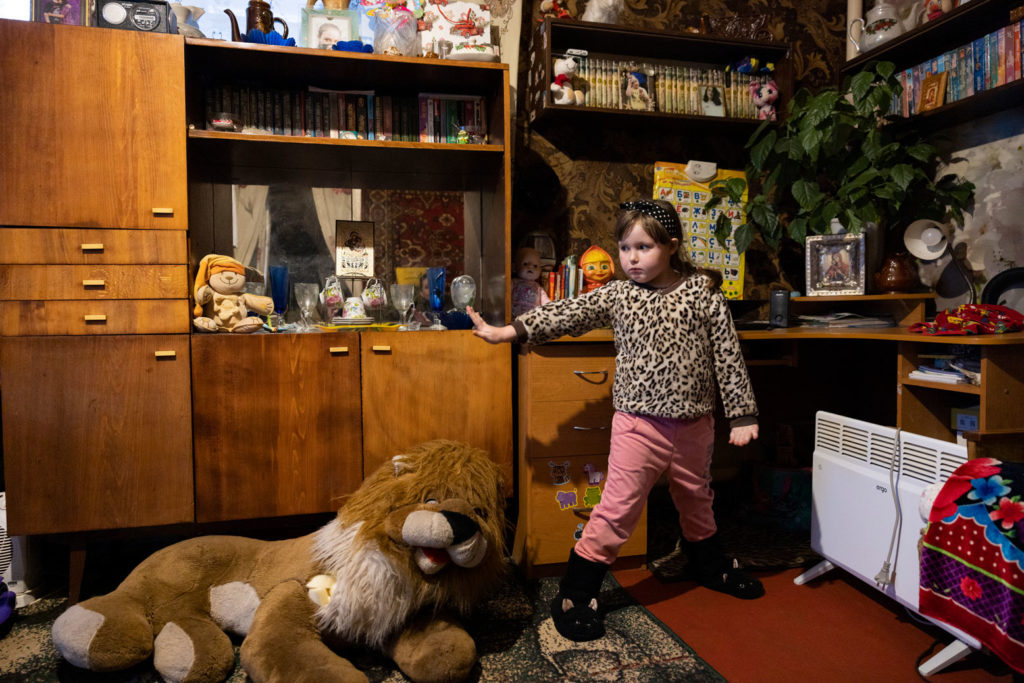
Mother Ljudmila, 36, is sitting at the kitchen table trying to explain what it is like to live and raise a child in the middle of a war. “Last night they shot a couple of times, but today they have not shot, yet. They shoot and we have got used to it,” Ljudmila says.
We ask Sofia if she is afraid when they are shooting.
“No, I’m not afraid, I’m five years old and out playing [with] my friend. But sometimes when they shoot a lot, then I run into the stairwell,” she replies.
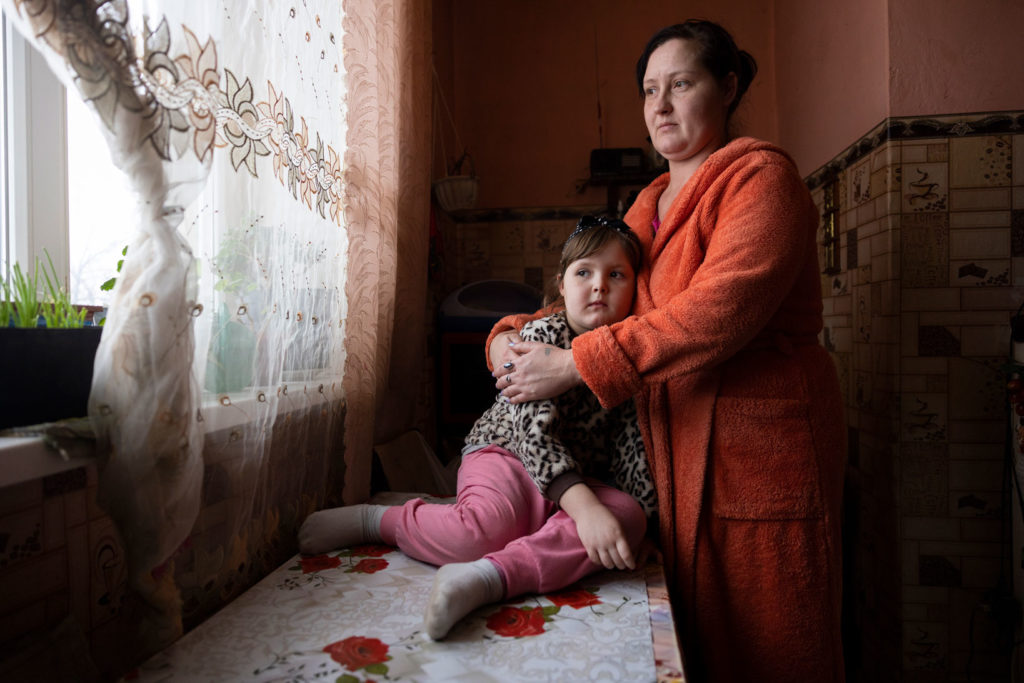
Ljudmila says that until Sofia was 2 years old, she was very scared during the shootings. “In the beginning we slept in the corridor when they were shooting with heavy weapons. She cried and trembled. But now she has got used to it.” Ljudmila adds, “She doesn’t even know about life in peace. She just knows what it is like now.”
It is a couple of miles from the dilapidated two-story house to the trenches. The inhabitants here feel let down and abandoned. In the house there are 12 apartments, eight of which are empty. In the next house there are only two apartments that are occupied. This makes it difficult to keep the apartments warm when the rest of the house is no longer heated. The wood stove in the kitchen is running round the clock, but the wood is expensive: the equivalent of about $240 for a tractor load. And soon it’s burned up.
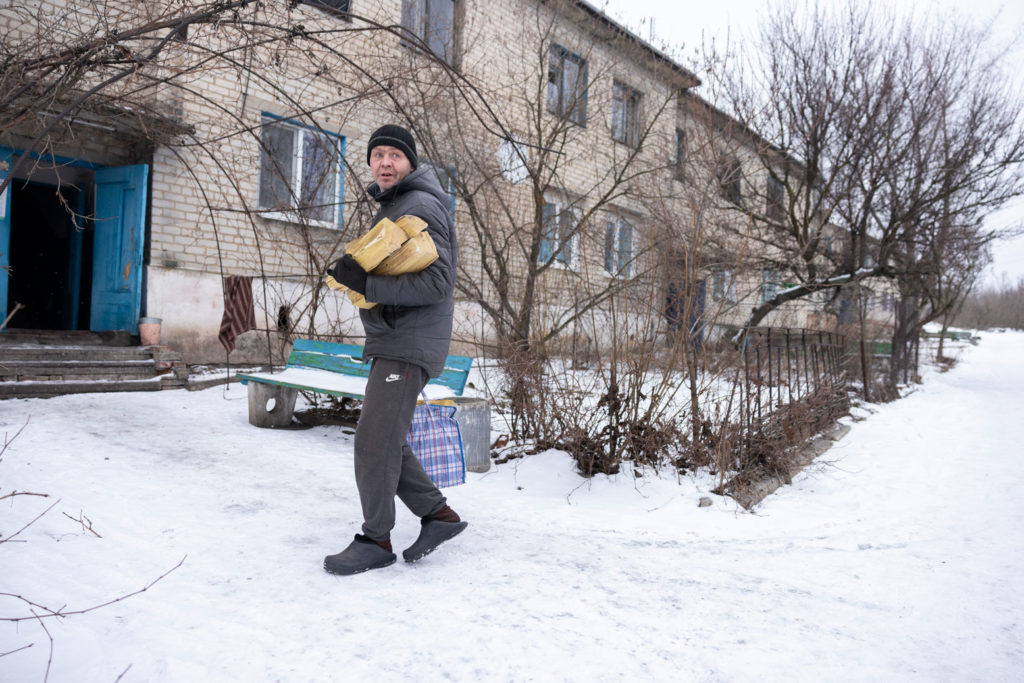
Sofia’s father, Gennady, 44, sits on a stool in front of the stove and smokes, blowing cigarette fumes into the fire. He had an apartment in Horlivka 40 minutes away, but the city is controlled by the rebels. And to get there, he has to make the two-day journey via Russia and then back.
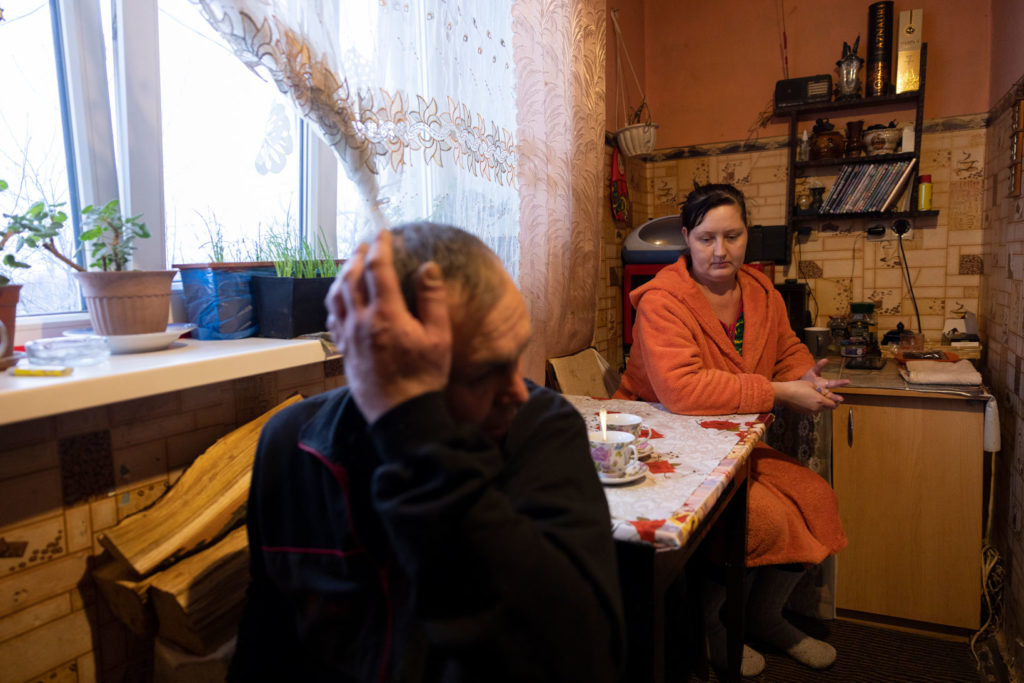
In Bakhmut, there is no running water since the pumping station was bombed a few years ago. They have to fetch water for toilets and laundry in buckets in the yard. The family gets about 25 gallons of clean drinking water a week. Ljudmila sacrifices some of it on us and puts on coffee. The gas to heat the water has run out, so she uses an old electric plate that she places on top of the unusable gas stove.
“We have already got used to what is happening here, and we have nowhere to move, so we have to live here,” she says. “It was a nice village, once upon a time. There was a factory and work. Now there are only ruins left.”
Before the war, Ljudmila was a cashier in a shop. To get a job now, they must be able to go into town, but there is no bus line. The family survives on what they can grow in their two garden lands.
“When spring comes, we work from morning to evening in the vegetable plot,” Ljudmila says. They grow potatoes, beets, radishes, tomatoes and dill, and they already planted the garlic in the autumn. The family also has 11 hens and a rooster. But, Ljudmila explains, there are not many eggs during the winter; when it is warmer there can be eight a day.
Sofia loves omelets and fried eggs. She asks for either every morning. Pancakes, on the other hand, are not an option; the flour must be bought with money they do not have.
“Without the vegetable plot, we would never have survived,” says Ljudmila.
It is lunchtime in Zaitseve in the Donetsk region. In a bunker in a field a couple of miles from Ljudmila’s house, two young soldiers have just woken up after their night shift. Andrei, 26, has a son who is 2 years old. His wife works at a bank. For more than four years he has served in the war.
Here in the bunker, the walls are covered in an insulating metal foil. They sleep on simple wooden beds with sleeping pads and sleeping bags. On the wall hangs a drawing from a preschool wishing the soldiers a happy new year. It has been quiet here for a while, they explain, and the days come and go. When they are not at their post looking out over the fields, they are focused on their survival in the trenches.
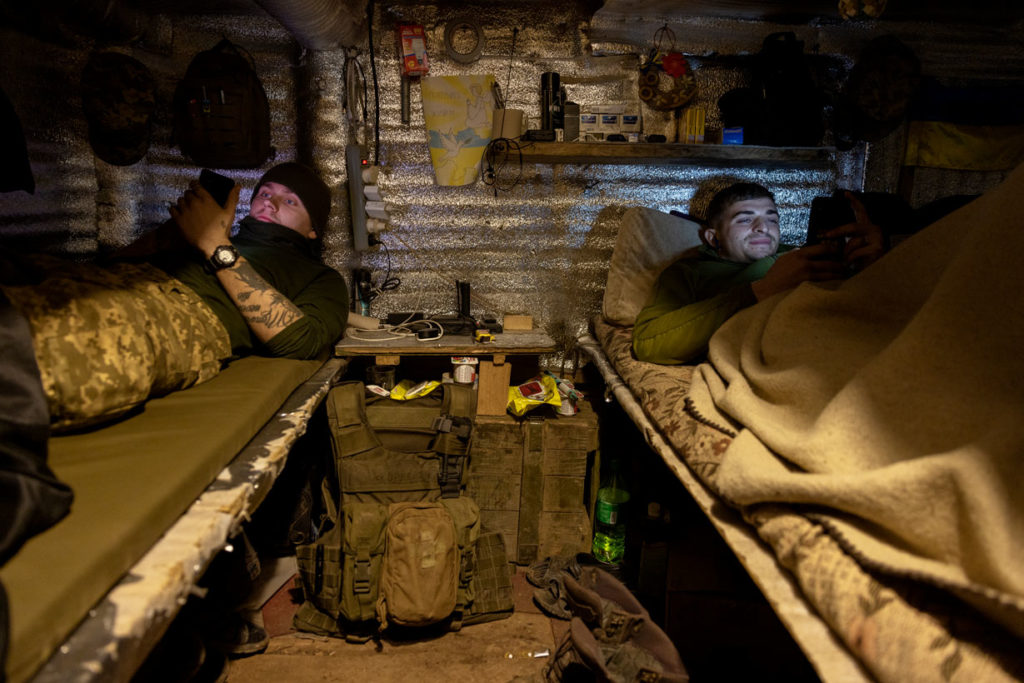
“We dig out of the trenches when the walls collapse. We shovel snow, saw and chop wood. Then it’s time for post, then food, and then it all starts again,” Andrei says, adding that if there is time left over, he watches a movie on his phone. The previous evening he had watched “Extraction,” an action movie about a mercenary who is paid to save a drug baron’s kidnaped son.
Although they live underground, news from the outside world reaches through. While we were there, the U.S. Embassy in Kyiv announced that it is beginning an evacuation of embassy staff and relatives. An additional 80 tons of weapons and ammunition from the U.S. has landed in Kyiv. The British foreign secretary has warned that Russia is planning a coup with the aim of installing a Putin-loyal leader in Kyiv. At the same time, train after train with Russian tanks and heavy weapons from eastern Russia roll in the direction of Ukraine.
“I try not to watch the news, so I do not get nervous unnecessarily,”
Andrei says. He misses his family, especially his 2-year-old son. “God willing, everything will be fine and I will see my son again soon.”
This dispatch is a collaboration between New Lines and Swedish newspaper Expressen.




